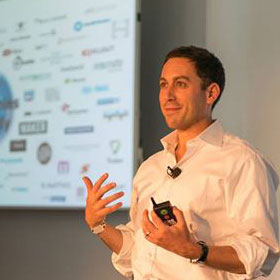Zynga Joins The Crowd
Posted on .Last week Zynga joined a select group of hot consumer companies, with a reported $500mm financing at a $10bn valuation. It didn’t take long since my previous post for another company to join this exclusive club. This time around I can’t help but weigh in.
Most people outside of the technology community and the 101 Expressway in San Francisco (where Zynga has a giant billboard) haven’t heard of Zynga. I know this because I applied the “Ohio Test” where I call people in Ohio and ask them if they have heard of something. At the moment the Ohio Test revealed that Groupon, Facebook, and Twitter are commonly known. Zynga elicited the response, “I don’t know but I think it is a website.” If you question my research methodology you should know that my sample is statistically significant among middle-age moms whose names begin with the letter S.
But these users do know the titles of Zynga’s games, such as FarmVille, MafiaWars, and CityVille. For the uninitiated I would characterize these as simple games that are played on Facebook. Many of them are clones of other games: CityVille is like SimCity, FarmVille is like Harvest Moon, and MafiaWars is a knock-off of Drug Wars, which I used to play on my TI-85 calculator during Biology in high school. Each game has the same, addictive game mechanics. It works like this: you sign in, you click on a few icons, and after approximately two minutes you run out of time/tokens/stamina/credits. If you are really addicted you pay money to get more time/tokens/stamina/credits, or you just wait until they naturally refresh.
I have played a bunch of these games, as have about 200,000,000 other people. From that standpoint Zynga is perhaps the most impressive gaming company of all time. It is a business that in 4 years has gone from an obscure poker game to a $10bn private valuation.
My friends say that Zynga makes “spreadsheet games”. It is a condescending reference to the fact that the games are meant to be played in two minute snippets (coincidentally that matches the attention span of people at work) and they don’t require strategy. In fact, if you search online there are “autoplayer” tools that play these games for you while you sleep, so you can continue to level up characters without spending money. These tools have a following, although many people spend money or fill out offers.
The fiendish part of the games is that they never end – they are designed as infinite loops where a user continues to do tasks, compete with other players, level up, until they either grow irritated or collapse at their keyboard from exhaustion.
It is curious that game design has gone this route. If you look at job postings for “Game Designer” on Zynga’s website the #1 qualification they are looking for is: “Tune and Model Complex Systems Using Excel”. This probably doesn’t help Zynga’s reputation as a spreadsheet game machine. Before the Zynga revolution a great game designer needed creativity to make games that were unique and fun to play. Now they need Excel. I suppose it also helps if they have an uncanny ability to copy other people’s games.
So why my fascination with Zynga? Back in 2004 I went with a group of friends to visit a game company called Electronic Arts. EA was founded in 1982 and is a major player in the video game business – they own the rights to the #1 game in every sports category (NHL Hockey, Madden NFL, FIFA Soccer, NBA Live, Nascar, Tiger Woods Golf) as well as a number of huge hits like SIMS, Rockband, Harry Potter, etc. Their games have high production costs, significant brand equity, and they are sold globally through retail channels. They make games for every console system, computer, and handheld device around. There is no dependence on Facebook, although they did acquire one of the top Facebook game makers, Playfish, in 2009. Electronic Arts is currently sitting on $2bn of cash, generates about $3.5bn a year in revenue, and employs 7,800 people. I can’t compare this to Zynga because the financials aren’t public, but I expect Zynga is significantly smaller.
What is the catch? As of last week, Zynga is now worth more than Electronic Arts.

Ian Sigalow
http://sigalow.comIan is a co-founder and partner at Greycroft Partners in New York City. He has been a venture capitalist since 2001.